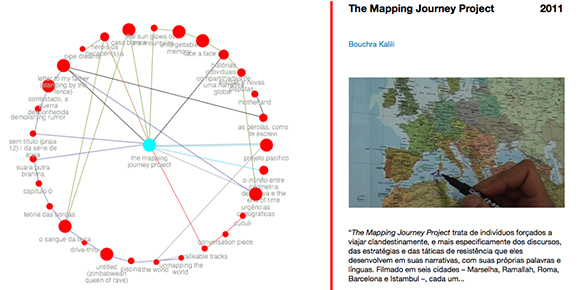Bouchra Khalili
A native of Morocco, Bouchra Khalili currently lives in Berlin. She grew up between Casablanca and Paris, where she graduated in Cinema and Visual Arts. The artist is concerned with discourses, strategies, and tactics of resistance as developed and narrated by members of political minorities, of which she considers migrants as a part. In an interview from 2006 to curator Eduardo de Jesus for FF>>Dossier 026, she revealed that her interest in video stems from the medium’s impurity, which appears to favor “the invention of a personal, experimental cinema.”
Her work – which is represented in the Videobrasil Collection – articulates transitional spaces, language, subjectivity, to suggest a reflection on the complex interactions between contemporary migrations, colonial history, physical and imaginary geography, in the era of globalization.
In the exhibition Unerasable Memories, four videos from the video installation The Mapping Journey Project (8 single channels) will be simultaneously screened. In the videos made between 2008 and 2011, individuals forced to travel clandestinely describe precisely with their own words their complex trajectories, while drawing them on a political map of the world. Khalili tells PLATFORM:VB that the key subject of this piece is the cartography of resistance it implies: The Mapping Journey Project questions how a human being can still resist, though trapped in the nets of arbitrary power.
The curator Omar Berrada signs a text about this work in the Unerasable Memories exhibition book, set for launch next October during a Public Programs meeting. Impacted by The Mapping Journey Project, Berrada declares: “you get the sense that you understand what is meant by ‘workers without documents,’ who are not included in statistics or in the blurry discourses on immigration, third world, European economy, or financial crisis. These people have taught a lesson on politics, economics and humanity. Were it not for the way Bouchra Khalili came up with to host their voices, you might not have had access to the lesson.”
Learn more about the artist:


